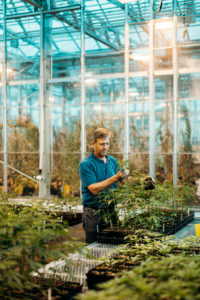Hot Hemp? It’s Likely the Genetics
The popular held belief is that growing conditions can lead to hemp with too much THC, but a recent study by Cornell University researchers found that genetics are the ultimate factor in THC content.

Larry Smart (faculty) examining hemp plants in the greenhouse at Cornell AgriTech.
Credit: Justin James Muir / CALS
THC is the psychoactive chemical that can make hemp “too hot.” Hemp must stay under 0.3% THC while its relative, cannabis, ranges in content from 15-20% THC. To be marketable, and legally grown, industrial hemp cannot exceed the legal limits of THC content.
Larry Smart, professor and researcher in the School of Integrated Plant Science, studied the genetics and growing conditions of hemp plants in two New York locations: Ithaca and Geneva. Smart and his colleagues found that growing conditions did not significantly impact THC content.
Rather, examining the genome shared more information in the likelihood of a plant being “hot.” The researchers identified THC genes within the plant and then created easy-to-use genetic markers for plant breeders to use. Although it’s not practical for farmers to genetically test an entire crop, the genetic markers will be valuable for plant breeders.
In fact, a variety used in the testing had two thirds of its seeds over the legal limit for THC. The tools developed by Smart and his colleagues will allow breeders to better assess the THC content and, in turn, benefit growers.
Read more about the research effort in CALS online news.

